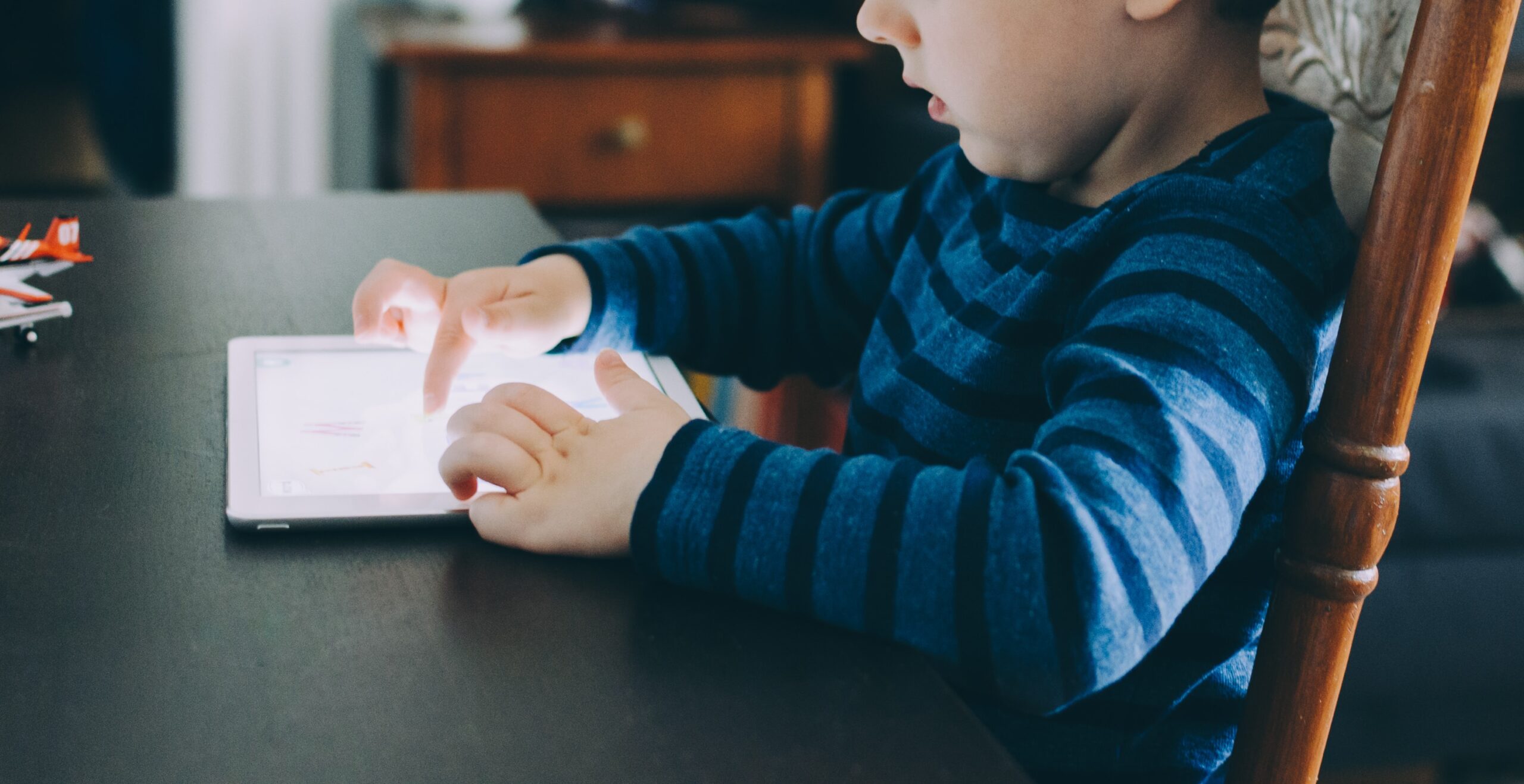Before we begin this conversation I want to give a quick reminder to all of us as parents: Our job is not to win a tech argument, but rather to steward the hearts of our children. Action may be required, but it should always happen from a place of love and humility.
We could start, for example, with the idea that 65% of parents are concerned their children are spending too much time in front of screens. Concern is a wonderfully humble start for conversations because it allows us to show our for our children love in action—we can be vulnerable with our concerns and loving in pointing them back to hope.
With that in mind, let’s talk smartphones. Every parent has to deal with the question: “Should my child have a smartphone?” The quick answer: No.
Jonathan Haidt, a professor with NYU’s Stern School of Business, sums up the smartphone dilemma well: The downsides outweigh the upsides (The Social Dilemma, 2020).
Smartphones might be compared to digital cigarettes. Cigarettes confer benefits to users in the form of increased focus and decreased appetite. Yet despite these benefits the number of smokers in the US have plummeted in recent decades, from 43% of adults smoking in 1965 to less than 15% today. Why? Because we are all-too-aware that the benefits pale in comparison to the downsides which include addiction and medical complications like emphysema and cancer.
Similarly, smartphones amplify our ability to consume ideas and engage with others, yet the data-mining of personal information, micro-targeted ads, and consumer-programming by trillion-dollar companies should be enough to convince us that smartphones are not worth the price of admission for our children.
We’ve dealt previously with the question of “Should my child have a smartphone?” a few times on the podcast:
- Episode 39: So you already gave your child a smartphone…what now?
- Episode 24: Why your child doesn’t need a smartphone
- Episode 60: The art of the dumb phone: An interview with Chris Kaspar of Techless
Today’s conversation, however, is the beginning a a deep-dive into the research and specifics of why smartphones aren’t worth the cost for our young people.
Phone or Smartphone?
When our children ask for a phone they almost always mean a smartphone. For most young people smartphones are part status symbol, part digital independence. Having the money to buy a nice phone is one thing, but having access to the apps they provide is another.
This is why when most young people say “I want a smartphone” what they really mean is “I want social media.”
It’s worth saying, however, if your child truly wants the ability to make phone calls and the occasional GPS just get them a Wisephone or a Gabb phone. This new generation of dumb smartphones provides the best tools and none of the distractions and allows you to cover all of the “but I need to be safe” aspects of wireless communication.
Let’s look at the research: Smartphones negatively impact focus
Just the presence of smartphones in class disrupts student learning. Beland & Murphy reviewed multiple schools across the United Kingdom and found standardized test scores improved markedly after the removal of smart phones from classrooms. Underachieving students saw the biggest jump, with grades raising one and half letter grades (14%) on average (2015).
We’ve known for nearly a decade that electronic media can distract from academic success (Jacobsen and Forste, 2011), but a study out of University of Chicago found that simply having a smart phone present can create “brain drain”. Basically, the brain has to buffer your desire to pick up the phone and look at it because it is so ultra-personal it trumps any other priority put before it (Ward, Duke, et al 2017). This study showed that no intervention short of removal was effective. Flipping a phone over, putting it away in a bag, and even turning it off all caused lower academic scores. The only effective solution was intentional separation.
This doesn’t mean young people are broken
We’ve heard lots of perspectives on how tech is impacting young people. Some very bright people would tell you that tech has contributed to young people who are lazier and more entitled than ever before. But is that true?
No one has a better persective on the quality of our youth, and the impact tech has had on them, than Roger Smith. Roger is a 30-year classroom veteran. His teaching career spans from the dawn of the internet to the introduction of school-provided one-to-one devices. He’s also the VP of the largest youth basketball camp in America which sees more than 10,000 attendees every year.
His first two thoughts on our youth and tech were a breath of fresh air and his third observation is worth reading twice:
- Young people, especially Millenials and Gen Z, are caring, socially minded, and motivated to see the world a be a better place. They’re going places and they’re taking us with them.
- These same young people use tech in ways we never dreamed to find solutions to problems we helped create.
- The single most destructive force for the classroom, and the family, is the smart phone. We too readily give our focus to this little device because it promises to always cater to us and our needs. Everything about a smart phone is about us and it’s easy to give our attention to something that always is there for us. So our studies suffer, our relationships suffer, our conversations suffer, and our connectedness suffer.
Tech doesn’t ruin our young people, but it can impact their focus. Left unchecked it has the ability to distract, isolate, and disrupt the most critical parts of their lives.
Focus is critical for academic learning
The research supports Mr. Smith’s experience. In the words of MIT professor Sherry Turkle: We’re all “alone together”, connected like never before but starving for meaning and relationship (2012). Our brains focus more like lasers than flashlights. We hone in extremely well on a single task, but it takes additional focus to switch back and forth between tasks (Hamilton, 2008).
The schools of Toronto, Canada found this out the hard way. In 2011, Toronto removed the ban on cell phones in the classroom because, “[they are] trying to prepare [students] for 21st century learning, and how can we do that when there’s a ban?”. The statement was made by Ms. Williams, a student trustee who helped get this rule passed (May 19, 2011). Six years later, in 2017, Toronto saw significant downsides in student focus and anxiety (a condition called nomophobia, February 26, 2017). By 2019, the entire province of Ontario (of which Toronto is the capital) banned phones in its classrooms in order to help students focus on the main goal of school: Learning ( March 12, 2019).
Smartphones damage sleep
The second reason for delaying your child’s smartphone goes hand in hand with the impact phones have on focus: Sleep.
It’s not just that your child might be more moody when she doesn’t get nine hours. Reduced sleep time has been linked to screen time and shorter periods of sleep are a risk factor for depression and suicide (Glozier et al, 2010), (Zhai, Zhang, & Zhang, 2015). If your child has any tech in their bedroom, especially a phone, their sleep is being impacted. Young people tend to stay up too late or allow their sleep to be interrupted by tech, and if their sleep is being impacted, their risk for depression, anxiety, and risky behavior goes up exponentially (Hysing et al., 2015).
Sleep impacts everything else
Dr. Matthew Walker, former professor of psychiatry at Harvard Medical School, and a professor of neuroscience and psychology at University of California Berkley says it this way: “When sleep is abundant, minds flourish! And when it’s not it’s a sad downward spiral that affects IQ, EQ, learning, memory, health, immune system… literally every body function” (Why We Sleep, p.316)! Every single function of our body, especially a developing teen’s body, is impacted by the quality and quantity of sleep we get.
The correlation of tech to sleep loss isn’t accidental. We’re consuming so much Drool Tech that major companies like Netflix see sleep, not other streaming services like Amazon or Disney+, as their main competition (PC Mag, 2017). They’re not wrong. A 2019 survey of video streaming in the UK found that 1/6 Brits spent 30+ hours a week streaming online content (PC Mag UK, 2019)! With that kind of investment, it’s tough to develop in any other area of life.
There are major tech companies vying to keep our children awake so they can profit off them, but it goes even a little deeper. Losing even just one hour of sleep can reduce academic performance, decrease a child’s ability to handle stress, and increase focus conditions like ADHD (Nurture Shock, Bronson & Merryman, 2009).
Conclusion: A smartphone is not worth the potential damage to sleep and focus.
If you’re the parent of a teen who is making his or her case for a smartphone, engage them in this conversation. Share this research, and then love them enough to not give them a smartphone. The benefits of smartphones can’t outweigh the intensity of distraction they bring for students.
We can’t be fully present and half-escaped into a world of our own creation. We can’t achieve our full potential when we can’t focus or sleep.






0 Comments